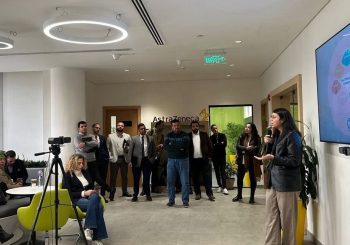For his interview, an applicant arrived early, dressed neatly and résumé in hand. During the interview, he spoke with clarity and confidence, outlining his experience and asking thoughtful questions. As he stepped out—hopeful—he caught sight of another candidate leaning casually against the front desk, trading jokes with the receptionist and laughing with someone from HR.
It was not overt, but there was a sense of familiarity. A few days later, there was no response or follow up from the company. No rejection, no feedback. Just the quiet assumption that the role had likely gone to someone already in the circle.
In today’s Egypt, where the line between opportunity and privilege often feels blurred, one question echoes loudly across youth forums and coffee shop conversations: Is talent enough to succeed, or is the system built to favor those with connections?
The term nepo baby, short for nepotism baby, went viral thanks to Western pop culture, particularly in Hollywood, where the children of celebrities often seem to be born into record deals and movie roles.
According to a 2024 journal article, the conversation gained widespread traction with Nate Jones’s December 2022 New York Magazine story, “The Year of the Nepo Baby,” which ignited heated debate over Hollywood’s long-standing tradition of nepotism—advantages passed down through family ties and insider connections that help keep access to opportunity tightly controlled. But in Egypt, this culture is far from novel. Here, it has long existed under a different name: “wasta.”
A father’s friend. A cousin in HR. A neighbor with influence. A handshake behind the scenes. Wasta is not just an idea, it is a reality that many Egyptians grow up learning to navigate. Increasingly, it is shaping how young professionals view fairness, career growth, and their future.
“My father helped me gain an internship at Dell because he personally knew the country manager of the company,” shared Mostafa Ahmed, a graduating senior at AUC studying physics. “Would I have gotten it without that connection? Maybe. But it would’ve taken a lot longer, if at all.”
Wasta is often rationalized as a necessity in a bureaucratic system where things move slowly and inefficiencies abound. Yet, it is also a deeply embedded barrier that disproportionately affects youth from middle- and lower-income backgrounds who lack access to elite schools, networks, or social circles.
“Wasta just means a person to whom you have a connection that would make you inherently commit nepotism,” explains Mostafa. “A lot of things in Egypt work that way. You either accept it or you fight an uphill battle.”
Many students and recent graduates think that this is not merely a perception, it is a pattern. In sectors ranging from media to government and tech, hiring practices often prioritize personal recommendations over professional portfolios. A 2014 study of youth employment in Egypt reports nearly half of private‑sector workers obtained their jobs through relatives or friends, and a third in the public sector relied on ”wasta” rather than open competitive exams. The result? A culture where connections matter more than qualifications.
“There aren’t many places where skill is appreciated,” says Fahd Mohy, who studied media and mass communication at AUC. “The game is kind of rigged, and connections make things go much faster.”
One of the most criticized sectors in this regard is the media and entertainment industry, where public trust is already fragile. While Egypt has long been considered a cultural powerhouse in the MENA region, the recent wave of television series, films, and variety shows have raised eyebrows for their uneven professionalism.
“The quality of the media products sucks,” says Mohy. “How do these people get those jobs? Sometimes they pay their way in or they know someone. Sometimes, it’s not about what you can do but about who you know.”
This environment leaves many talented youth feeling disillusioned, watching lesser-qualified candidates climb ladders that seem off-limits to them. For students, it could provide a sense that success is pre-written, not earned.
Take, for example, a recent Ramadan series like Aisha El Dor (Living The Role, 2025). Several cast members delivered notable performances, showing clear effort and skill in their roles. However, viewers pointed out on social media that a significant portion of the cast comes from well-known families in the entertainment industry. While this does not diminish their talent or dedication, it does raise questions about access and opportunity. In a competitive field, having industry connections may ease the path to casting, highlighting the broader conversation around merit, privilege, and how careers are built in Egypt’s creative scene.
A Culture of Convenience or a Cycle of Stagnation?
Supporters of wasta argue that in a country where the formal job market can be difficult to enter and trust in systems is sometimes low, personal connections are the only reliable bridge to opportunity. “It’s how things get done,” is what supporters of wasta say.
However, landing the job does not necessarily mean that people will last in it. Despite the large number of nepotistic hiring, what makes a person truly last in their job is whether or not they have the skills and are actually qualified to get the job done.
Nepotism could slowly fade away due to the goals of Egypt’s Vision 2030, the national strategy that emphasizes inclusive economic growth, innovation, and institutional reform. One of Vision 2030’s pillars is boosting the role of youth and enhancing the private sector’s capacity to absorb a skilled workforce. Yet, this mission becomes difficult to fulfill if hiring decisions are made based on family names rather than CVs.
Still, some signs of change are emerging.
Cracks in the System
Digital platforms like Wuzzuf, Forasna, and LinkedIn have begun to open up opportunities for candidates outside traditional circles. Many Egyptian startups, especially in tech and fintech, now prioritize skills tests and blind applications to level the playing field.
There are also youth-led media collectives, art spaces, and tech hubs like Startup Haus Cairo and KMT House that deliberately foster inclusivity and focus on mentorship, regardless of background.
International collaborations and internships are helping some young Egyptians bypass traditional gatekeepers. Some multinational companies like Microsoft and Dell now have transparent hiring portals and are hiring external recruiters to avoid bias.
Despite these developments, the influence of wasta remains strong as it is sometimes seen as a coping mechanism to scarce jobs.
Wasta functions as a form of social capital, rooted in norms of reciprocity, empathy, and trust, compensating for weak formal institutions. As such, many Egyptians are caught in a paradox: believing in the power of hard work, yet knowing full well that a phone call from the right person can shortcut months or years of effort.
Is nepo baby culture the only path to success in Egypt? Not entirely, but for now, it remains one of the most reliable ways, especially when the rules are unclear and the playing field is not level.
Wasta is a system that rewards access over effort ,but it also fuels the youth to be creative. More and more young Egyptians are choosing to build outside the system: launching startups, creating art independently, freelancing globally, and redefining what success looks like on their own terms.







Comments (0)